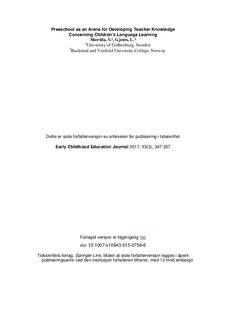Preeschool as an Arena for Developing Teacher Knowledge Concerning Children’s Language Learning
Journal article, Peer reviewed
Accepted version
Permanent lenke
http://hdl.handle.net/11250/2457710Utgivelsesdato
2016Metadata
Vis full innførselSamlinger
- Institutt for pedagogikk [285]
- Publikasjoner fra CRIStin [3623]
Sammendrag
The most important benefits of international comparisons are the indications that make hidden national characteristics visible and shed new light on the system in each country. From a comparative perspective, this article explores what Swedish and Norwegian preschool teachers emphasise as important to preschool student teachers about preschool as an arena for children’s language learning. The theoretical framework of the study is based on ecological system theories (Bronfenbrenner in The ecology of human development, Harvard University Press, Cambridge, 1979; Bronfenbrenner in Dev Psychology 22(6):723–742, 1986) and socio-cultural theories concerning language learning (Vygotsky in Thought and language, MIT Press, Cambridge, 1986). The data are produced through interviews with 69 Swedish and 35 Norwegian preschool teachers. The analyses focused on what the preschool teachers stated to be the most important elements to work with concerning children’s language learning, how and why they worked like this, and what rationales may have led to their pedagogy. The two countries seem quite alike in terms of the values embedded in early childhood education and political ideas concerning a rich childhood based on play and democratic ideals. By comparing the two countries, the results reveal differences that can lead to a deeper knowledge of cultural concepts that are often taken for granted, such as pedagogical approaches, and how these create different conditions for children’s preschool language learning.
